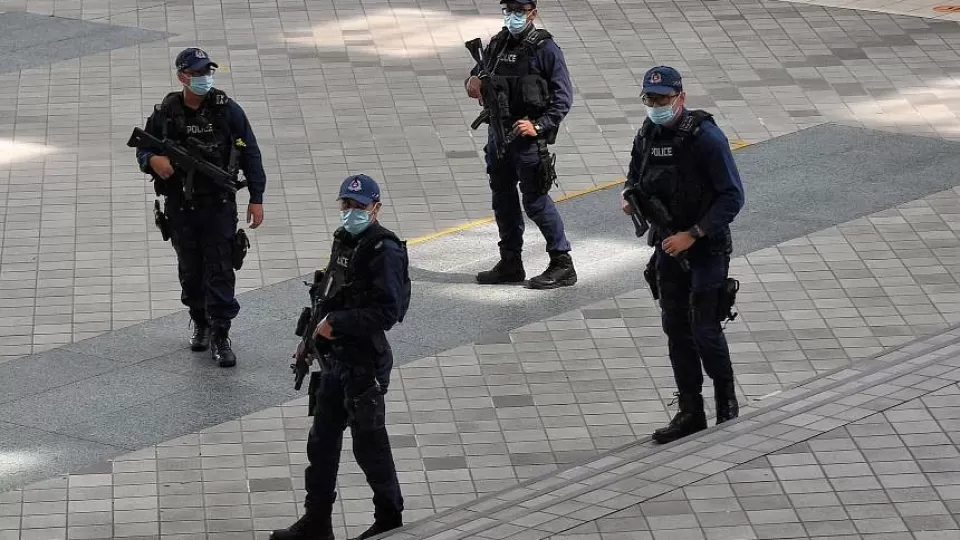January 6, 2023
SINGAPORE – The primary terrorist threat to Singapore still comes from self-radicalised individuals, according to a report released by the S. Rajaratnam School of International Studies (RSIS) on Tuesday.
But the report also noted that the authorities should stay vigilant, as the easing of Covid-19-related movement restrictions could lead to a resurgence of terrorist activity in the region.
Although just one person was detained under the Internal Security Act (ISA) in 2022, the Singapore authorities continued to uncover cases of self-radicalisation that year, according to Counter Terrorist Trends and Analyses (CTTA), an annual report assessing the global terror threat.
The Republic also continues to feature as a high-value target in the propaganda of Islamist terror groups – such as the Islamic State in Iraq and Syria (ISIS) – even if there are currently no specific or credible terrorist threats to Singapore.
“The Internet continues to play a pivotal role in sustaining the momentum of the global jihadist movement. This ‘cyber jihad’, waged on a borderless virtual battlefield, is a potential security minefield in a highly digitally connected society like Singapore,” said CTTA.
“In Singapore, the primary threat still emanates from individuals self-radicalised through online means. While figures (for those dealt with under the Internal Security Act) have declined slightly in recent years – from a high of 17 cases in 2016 to a single case each in 2021 and 2022 – cases of self-radicalisation persist.”
Since 2015, 45 self-radicalised individuals have been dealt with under the ISA, comprising 33 locals and 12 foreigners.
Last year, the sole person detained under the ISA was 29-year-old Singaporean Radjev Lal Madan Lal in April, who had made preparations to travel to overseas conflict zones to take up arms.
He had been convinced by the online sermons of foreign preachers such as Imran Hosein, Anwar Al-Awlaki and Musa Cerantonio that it was his religious obligation to fight against the enemies of Islam.
He had expressed that, if instructed, he was willing to conduct an attack in Singapore, or against Singaporean interests overseas, although he did not have specific plans to do so at the time of his arrest.
The 120-page report is compiled by RSIS, with sections written by various country and regional experts.
The section on Singapore is put together by senior analyst Kalicharan Veera Singam and research analyst Abigail Leong at the International Centre for Political Violence and Terrorism Research, a constituent unit of RSIS.
Noting that Singapore’s Internal Security Department had assessed the terror threat to be “high” in 2022, as it did in the past few years, the two said that the ability of terrorist groups to operate and recruit in Singapore or plot attacks in the country has nevertheless been limited.
The return of the Taliban to power in Afghanistan has not resulted in more collaborations with regional networks such as the Jemaah Islamiyah, the two analysts said.
The report also said that Covid-19 movement restrictions have dampened the recruitment and activities of regional terrorist groups and their funding, leading to a significant number of terrorists surrendering in the Philippines’ Mindanao region in the past three years due to fatigue, hunger and declining financial support.
The two analysts added that in 2022, there were no new cases of terrorism financing reported.
In May, the Government barred Indonesian preacher Abdul Somad Batubara from entering the country, prompting a backlash from his followers, including those who protested outside Singapore’s embassy in Jakarta and consulate-general in Medan as well as online.
Both authors said the easing of pandemic-related restrictions means the authorities will have to keep being proactive against terrorist recruiters.
They cited audio files released online in September by the ISIS’ Al-Furqan media, in which group spokesman Abu Umar al-Muhajir called on Muslims in Singapore and other Asian states to join the organisation.
RSIS dean Kumar Ramakrishna said in the report that such calls must be taken seriously, especially as cross-border movements increase in frequency and considering recent regional developments.
In December, a suicide bomber reportedly linked to the pro-ISIS militant group Jamaah Ansharut Daulah attacked a police station in the Indonesian city of Bandung, killing a police officer.
The authors added that a close eye must be kept on fault lines surrounding race and religion, referencing Australian national Andrew Gosling who flung a bottle from his condominium in Spottiswoode Park Road towards a group of Malay Muslims and a senior polytechnic lecturer who made racist remarks in Orchard Road to a mixed-race couple.
“While these are isolated and one-off incidents that are not part of a wider domestic trend, they highlight the importance of maintaining tolerance and harmony in Singapore’s society, given a global climate currently challenged by religious extremism and violence,” they said.


